 W
WBeowulf is an Old English epic poem consisting of 3,182 alliterative lines. It is one of the most important works of Old English literature. The date of composition is a matter of contention among scholars; the only certain dating pertains to the manuscript, which was produced between 975 and 1025. The anonymous poet is referred to by scholars as the "Beowulf poet".
 W
WBeowulf is a legendary Geatish hero in the eponymous epic poem, one of the oldest surviving pieces of literature in the English language.
 W
WThe Benty Grange helmet is a boar-crested Anglo-Saxon helmet from the 7th century AD. It was excavated by Thomas Bateman in 1848 from a tumulus at the Benty Grange farm in Monyash in western Derbyshire. The grave had probably been looted by the time of Bateman's excavation, but still contained other high-status objects suggestive of a richly furnished burial, such as the fragmentary remains of a hanging bowl. The helmet is displayed at Sheffield's Weston Park Museum, which purchased it from Bateman's estate in 1893.
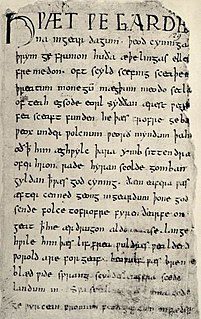 W
WBeowulf: A New Verse Translation is a verse translation of the Old English epic poem Beowulf into the modern English language by Seamus Heaney. Translated throughout the late 1990s, it was published in 1999 by Farrar, Straus, and Giroux and won that year's Whitbread Book of the Year Award. It is dedicated in memory of poet and translator Ted Hughes.
 W
WBeowulf: A Translation and Commentary is a prose translation of the early medieval epic poem Beowulf from Old English to modern English. Translated by J. R. R. Tolkien from 1920 to 1926, it was edited by Tolkien's son Christopher and published posthumously in May 2014 by HarperCollins.
 W
WBeowulf: The Game is a hack and slash video game for Microsoft Windows, PlayStation 3, PlayStation Portable and Xbox 360. It is based upon the 2007 film Beowulf. It was released on November 13, 2007 in the United States. The characters are voiced by the original actors who starred in the film.
 W
WBeowulf: The Legend is a 2005 designer board game by Reiner Knizia. The artwork is by John Howe. Game play uses cards and tokens. The play moves along a board, and players obtain gold and cards in order to eventually obtain victory points.
 W
W"Beowulf: The Monsters and the Critics" was a 1936 lecture given by J. R. R. Tolkien on literary criticism on the Old English heroic epic poem Beowulf. It was first published as a paper in that year in the Proceedings of the British Academy, and has since been reprinted in many collections.
 W
WEarnanæs, Aranæs and Aranäs is the name of at least two locations, in what is today southern Sweden, which are known from history and legend. The names are variations of the same name, and this has aroused the interest of scholars since the 19th century.
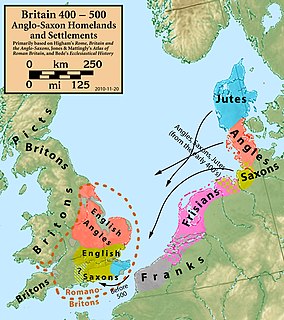 W
WThe Battle of Finnsburg was a conflict in the Germanic heroic age between Frisians with a possible Jutish contingent, and a primarily Danish party. Described only in later Anglo-Saxon poetry, if the conflict had an historical basis it most likely occurred around 450 AD.
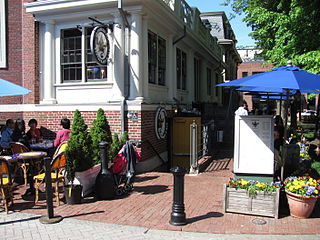 W
WGrendel's Den is a bar and restaurant in Harvard Square in Cambridge, Massachusetts, located at 89 Winthrop Street. The establishment is frequented by both students and professors of Harvard University as well as many others from the Cambridge and Boston area. The name was a reference to Grendel, the antagonist in the Old English epic Beowulf.
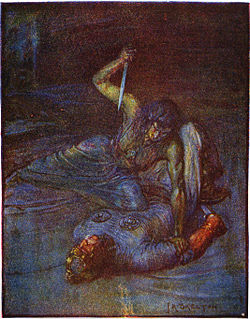 W
WGrendel's mother is one of three antagonists in the anonymous Old English poem Beowulf. The other antagonists are Grendel and the dragon, all aligned in opposition to the hero Beowulf. She is introduced in lines 1258b to 1259a as: "Grendles modor/ides, aglæcwif".
 W
WHeorot or Herot is a mead-hall and major point of focus in the Anglo-Saxon poem Beowulf. The hall, located in Denmark, serves as a seat of rule for King Hrothgar, a legendary Danish king. After the monster Grendel slaughters the inhabitants of the hall, the Geatish hero Beowulf defends the royal hall before subsequently defeating him. Later Grendel's mother attacks the inhabitants of the hall, and she too is subsequently defeated by Beowulf. The hall is generally held to correspond to the great hall of Lejre in Denmark found in North Germanic texts. A location of the same name receives mention in the Old English poem Widsith.
 W
WNæġling is the name of one of the swords used by Beowulf in the Anglo-Saxon epic poem of Beowulf. The name derives from "næġl", or "nail", and may correspond to Nagelring, a sword from the Vilkina saga. It is possibly the sword of Hrethel, which Hygelac gave to Beowulf. Næġling is referenced many times as a fine weapon—it is "sharp", "gleaming", "bright", "mighty", "strong", and has a venerable history as an "excellent ancient sword", "ancient heirloom", and "old and grey-coloured". However, the sword does not survive Beowulf's final encounter with the dragon, snapping in two—not because of the dragon's strength, but because of the hero's strength:
 W
WThe Nowell Codex is the second of two manuscripts comprising the bound volume Cotton MS Vitellius A XV, one of the four major Anglo-Saxon poetic manuscripts. It is most famous as the manuscript containing the unique copy of the epic poem Beowulf. In addition to this, it contains first a fragment of The Life of Saint Christopher, then the more complete texts Wonders of the East and Letters of Alexander to Aristotle, and, after Beowulf, a poetic translation of Judith. Due to the fame of Beowulf, the Nowell codex is also sometimes known simply as the Beowulf manuscript. The manuscript is located within the British Library with the rest of the Cotton collection.
 W
W"On Translating Beowulf" is an essay by J. R. R. Tolkien which discusses the difficulties faced by anyone attempting to translate the Old English heroic-elegiac poem Beowulf into modern English. It was first published in 1940 as a preface contributed by Tolkien to a translation of Old English poetry; it was first published as an essay under its current name in the 1983 collection The Monsters and the Critics, and Other Essays.
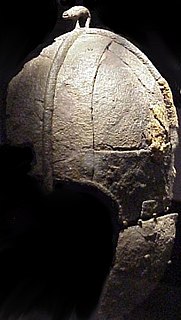 W
WThe Pioneer Helmet is a boar-crested Anglo-Saxon helmet from the late seventh century found in Wollaston, Northamptonshire, United Kingdom. It was discovered during a March 1997 excavation before the land was to be mined for gravel and was part of the grave of a young man. Other objects in the grave, such as a hanging bowl and a pattern welded sword, suggest that it was the burial mound of a high-status warrior.
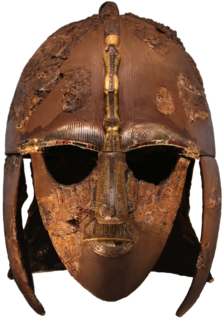 W
WThe Sutton Hoo helmet is a decorated and ornate Anglo-Saxon helmet found during a 1939 excavation of the Sutton Hoo ship-burial. It was buried around 625 and is widely believed to have belonged to King Rædwald of East Anglia; its elaborate decoration may have given it a secondary function akin to a crown. The helmet was both a functional piece of armour that would have offered considerable protection if ever used in warfare, and a decorative, prestigious piece of extravagant metalwork. It is described as "the most iconic object" from "one of the most spectacular archaeological discoveries ever made," and perhaps the most important known Anglo-Saxon artefact.